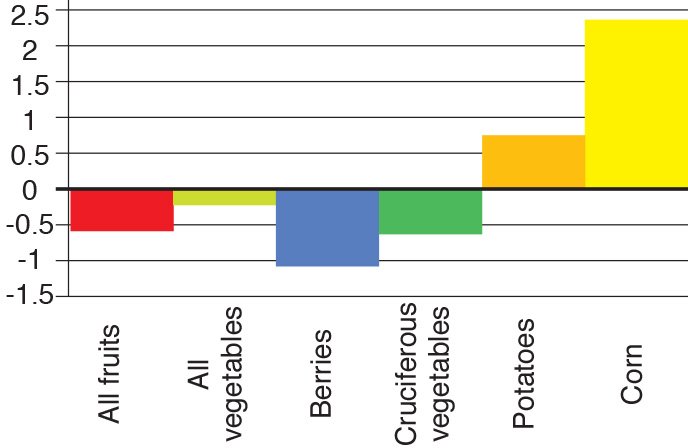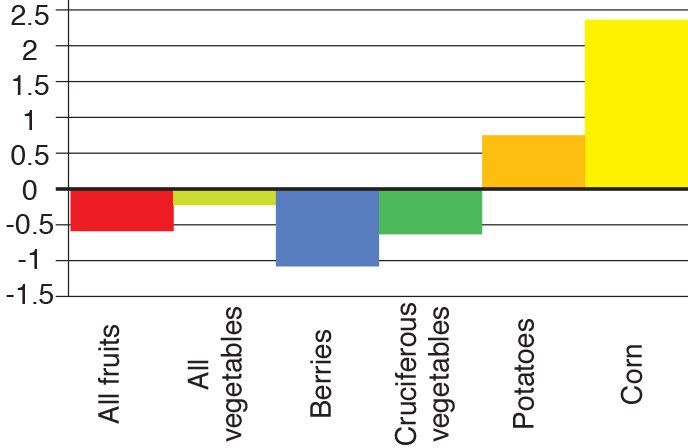[Updated May 14, 2018]
Easy Ways to Eat More Fruits & Veggies
1. Use fruits in your breakfast, atop cereal or in smoothies.
2. Incorporate shredded, grated or pured vegetables in stews, casseroles or pasta dishes.
3. Use frozen veggie mixes to whip up quick stir fry dishes and other entres.
4. Try carrots and hummus and broccoli with peanut butter as easy snacks.
5. Choose fruits for snacks or instead of sugary desserts.
You already know that fruits and vegetables are good for you – but did you know they might also be good for avoiding extra weight as you age? A new study analyzing data on 133,468 men and women over up to 24 years reports that eating more fruits and non-starchy vegetables is associated with modest weight loss. The weight-control benefits were greater for fruits than vegetables, and strongest for certain types of produce: berries, apples and pears, citrus fruits, tofu and soy, cauliflower, other cruciferous vegetables such as broccoli and Brussels sprouts, and leafy green vegetables.
“Phenolic-rich fruits, such as berries and apples, were most strongly linked to less weight gain,” says Dariush Mozaffarian, MD, DrPH, dean of Tufts’ Friedman School and editor-in-chief of the Health & Nutrition Letter, who was a co-author on the study. “This suggests that bioactive compounds in these foods may be positively influencing our bodies’ mechanisms for long-term weight control.”

Fiber and Glycemic Load in Weight Management
Dr. Mozaffarian and colleagues hypothesized that greater consumption of fruits and vegetables with a higher fiber content and/or a lower glycemic load might be associated with healthier weight changes over time. Higher-fiber foods increase satiety. Foods with a lower glycemic load, a measure of how rapidly a typical serving boosts blood sugar, may reduce hunger later on by limiting blood-sugar spikes.
To test these ideas, researchers looked at data from three large population studies in which participants reported their food consumption and weight every four years. Results were adjusted for a wide range of lifestyle factors. The researchers cautioned that the study was not designed to prove cause and effect, and was limited to a largely well-educated white population.
In findings published in PLOS Medicine, each incremental daily serving of vegetables was associated with a four-year weight loss of 0.25 pounds. Vegetables higher in fiber and lower in glycemic load such as broccoli and Brussels sprouts were more strongly associated with maintaining a healthy weight. Greater fruit intake was associated with weight benefits regardless of fiber content or glycemic load.
Starchy Veggies Cause Weight Gain
Intakes of starchy vegetables such as corn, peas and potatoes were each associated with more weight gain, however. (The potatoes result was for boiled, baked or mashed potatoes, and doesn’t even include popular forms such as potato chips or French fries.) Corn was most strongly associated with weight gain, with each daily serving linked to 2.04 extra pounds every four years.
“Although these starchy vegetables have nutritional value, such as potassium, vitamin C, vitamin B6, iron, fiber and protein, they have a higher glycemic load,” says Dr. Mozaffarian. “This large amount of starch likely explains their positive association with weight change.”
Apples and Berries for More Weight Loss
Each incremental daily serving of fruit was associated with weight loss of 0.53 pounds. (The study looked only at whole fruit, not juice.) When individual fruits were analyzed, increased intakes of blueberries, prunes, apples, pears, strawberries, grapes and raisins, and grapefruit were inversely associated with four-year weight changes. Strongest benefits were seen for fruits rich in phenolics, biologically active plant compounds with anti-inflammatory and antioxidant properties.
All fruits and vegetables bring something to your table in terms of nutrition. If you’re watching your weight or concerned about “middle-age spread,” however, eating more fruits and non-starchy vegetables in place of less-healthy foods might improve what you see when you step on the scale.
























